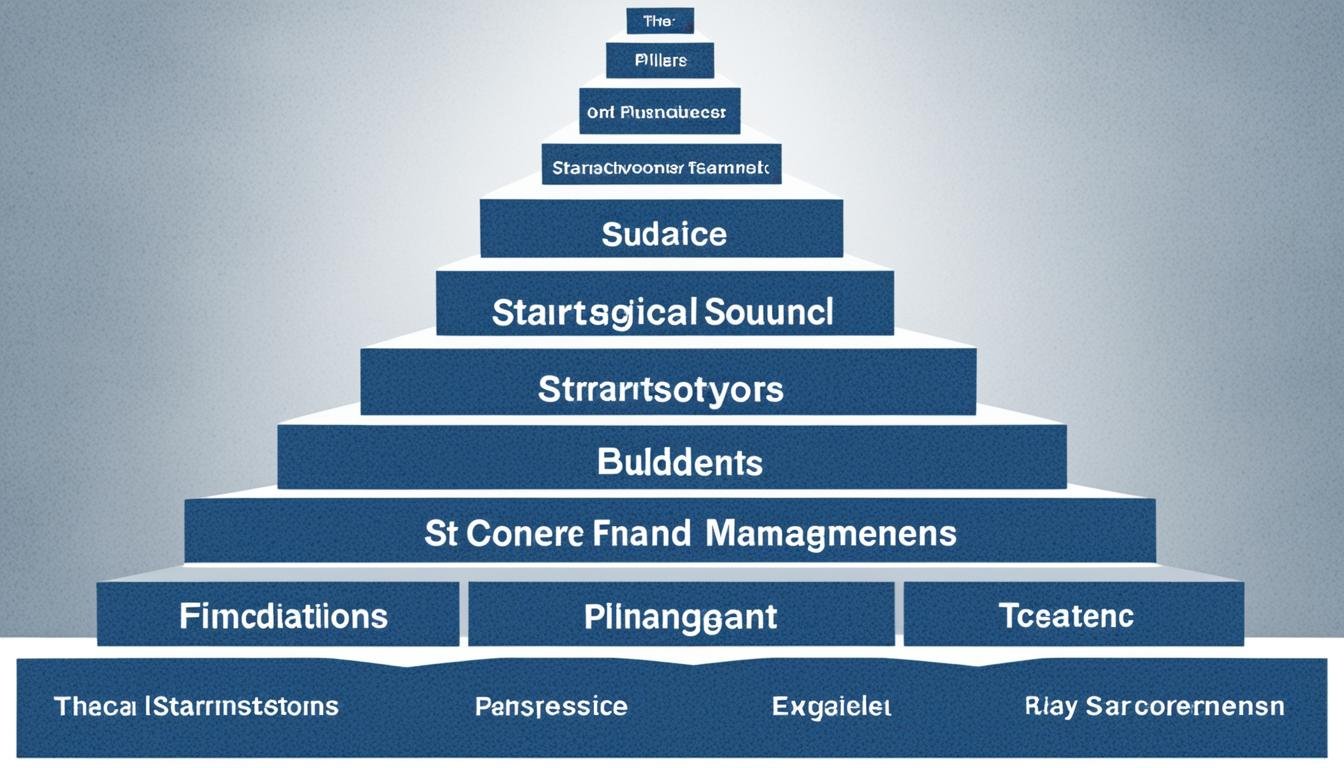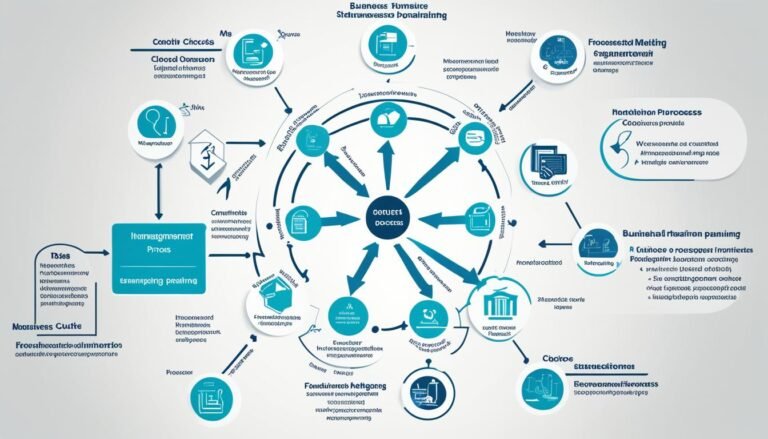What are the cornerstones of sound financial management?
In our fast-paced world, handling money well is crucial. About 78% of Americans live from one paycheck to the next. This fact shows how important it is for everyone to learn about personal finance.
Good financial management is like building a strong house. It needs smart ways to handle money, budget well, and plan for the future. These are key for reaching our financial dreams and protecting what we earn.
Key Takeaways:
- Effective money management and smart budgeting are crucial for sound financial management.
- Investment planning and risk management play a crucial role in building wealth.
- Financial literacy and decision-making skills are essential for making prudent financial choices.
- Developing good financial habits is important for long-term financial success.
- By incorporating these cornerstones into their financial decision-making, individuals can navigate the complexities of personal finance and achieve their financial goals.
Importance of Saving and Asset Building
Saving and building assets are crucial in managing your money well. By using good budgeting, managing credit, handling debt, and smart banking, you set up a solid financial future.
Sound Financial Planning
Creating a plan is the base of a strong financial life. It means setting goals and keeping your finances in check. Saving and investing are crucial for securing your future for things like education, retirement, and unexpected events.
Personal Money Management Skills
Learning how to manage your money is key for financial success. Budgeting helps you keep track of what you earn and spend. It lets you use your money wisely and avoid getting into too much debt. Managing your credit well means you keep a good credit score and can use that for better financial choices.
Planning for the Future
Asset building means more than just saving. It’s about putting your money into things that will bring returns, like real estate or stocks. Planning ahead ensures you’ll have the money you need to reach your dreams, like owning a home, starting a business, or retiring comfortably.
“Saving and asset building are essential for individuals to effectively manage their finances and increase their financial power.”
If you save regularly, you can have money set aside for emergencies. This fund acts like a safety net when life throws unexpected challenges at you. Also, by wisely building your assets, you can turn your money into more money. This process helps your wealth grow.
By focusing on saving and asset building, you can shape a secure future and reach your goals.
Resources for Financial Education and Assistance
When talking about learning and help with money matters, many useful resources are out there. They help with a lot of finance areas, like planning for retirement, offering financial services, and teaching personal finance.
Financial Education Organizations
- The Women’s Institute for a Secure Retirement (WISER)
- Save for America
- MsMoney
- Credit Counseling Services of Southern New England
- National Association of State Treasurers
- National Endowment for Financial Education
- American Savings Education Council
- An Income of Her Own
These groups give valuable info through seminars, workshops, and online classes. Also, they have materials to learn from. This helps people know more about finance and make good money choices.
Earned Income Tax Credit and Volunteer Income Tax Assistance
The earned income tax credit (EITC) benefits low-income people by giving them a tax credit. This credit can boost their income by a lot. VITA provides free tax help to ensure everyone gets the tax breaks they should.
The EITC and VITA are there to make taxes easier and help families keep more money.
Financial Literacy Links and Resources
Online, you can find many sites with finance links and info. They cover a lot, like managing money, retirement planning, and getting financial help and advice. By using these sites, you can get smarter about finance and make better choices with money.
Learning about money is an ongoing thing. Use these resources often to get better at handling your finances and making smart money moves.
| Financial Education Organizations | Financial Assistance Programs | Financial Literacy Links |
|---|---|---|
| Women’s Institute for a Secure Retirement (WISER) | Earned Income Tax Credit (EITC) | Smart About Money |
| Save for America | Volunteer Income Tax Assistance (VITA) | MyMoney.gov |
| MsMoney | Investopedia | |
| Credit Counseling Services of Southern New England | Khan Academy – Personal Finance | |
| National Association of State Treasurers | Financial Industry Regulatory Authority (FINRA) – Financial Education | |
| National Endowment for Financial Education | NerdWallet | |
| American Savings Education Council | Money Crashers | |
| An Income of Her Own | The Balance – Personal Finance |
Use these resources to get in the driver’s seat of your financial life. They help you start strong for a secure financial future.
Investing Basics
Investing is key in managing money well. It lets people build wealth towards their goals. If you’re starting to invest or growing your investments, knowing the basics is very important.
Getting Started
Start investing with small amounts. As you get more experienced, you can add more money. This way, you learn without the risk of losing a lot.
Begin with mutual funds for a safer option. These funds gather money from many people. Then, they invest in many things, reducing the risk.
Investment Strategies
Having a good strategy is vital for success in the long run. Spread your money over different types of investments. This helps lower risks caused by changes in the market.
Before investing, do your homework on the companies or funds. Look at their financial health and market trends. Getting advice from professionals, especially in the beginning, is smart.
Considerations for Investors
Know the costs of investing, like brokerage fees. High fees can reduce your earnings. Always pick investments with fair fees.
Also, check the companies’ or funds’ stability. Look into their profits, debts, and how they compete. This will guide your investment choices better.
Never forget that investing carries some risk. Always do your research and get help when you need it. By sticking to basic principles and staying informed, you can reach your financial ambitions.
Investment Advisers and Research
Choosing the right investment adviser is key when seeking advice. They help you make sense of your financial options in today’s complex market.
It’s crucial to pick an adviser who is both licensed and registered. These professionals have the right education and skill to lead you toward your investment targets.
Investment advisers, along with their companies, must share important financial details publicly. This ensures transparency and protects you, the investor. You can check their credibility through regulatory bodies and licenses.
Before selecting an adviser, do your homework. Check their background, credentials, and track record. Also, look into any past issues that could be a warning sign.
Watch out for those who may not have your best interests at heart. Some people in the finance world are not trustworthy. With enough research, you can avoid scams and ensure your money is well looked after.
“The stock market is filled with individuals who know the price of everything, but the value of nothing.” – Philip Fisher
Using financial data wisely can help shape your investments. It’s wise to stay current with market trends and opportunities. Reliable news, investment research, and government data are valuable sources.
Choosing a good adviser and staying informed can protect your financial future. Remember, your investments depend on making smart, informed choices.

Integrating Financial Management into Strategic Portfolio Management (SPM)
Financial management is key in strategic portfolio management (SPM). It helps organizations balance their goals with their financial resources for success.
The Importance of Financial Planning
Financial planning is vital for SPM. It lets organizations map out their financial goals and use resources wisely. This ensures they can choose the right investments and manage their capital well.
Strategic Budgeting for Resource Optimization
Budgeting is crucial in SPM. It means looking at what money is available, setting priorities, and deciding how to spend it. Funds are distributed to projects that bring strategic benefits and solid returns.
Effective Capital Management for Growth
Managing capital is key to growing sustainably and making a profit. It helps shape an organization’s financial setup, shores up risk management, and propels key initiatives.
Strategic Financial Analysis and Asset Allocation
Deep financial analysis is key to spotting the right investments and understanding the risks. It lets organizations make smart choices in how they divide their assets, aiming for a good balance of risk and reward.
Financial Forecasting and Reporting for Informed Decision-Making
Forecasting finances and updating reports regularly prepares organizations for what’s ahead. It helps them plan for challenges and make decisions that support their goals.
Working Capital Management for Operational Efficiency
Managing working capital well ensures day-to-day operations run smoothly. Skills in handling cash, accounts, and inventory mean better efficiency and financial health.
Financial Accounting for Transparency and Compliance
Keeping accurate financial records is crucial for clear dealings and meeting rules. It’s about creating trustworthy reports through proper record-keeping and following standards.
Corporate Finance and Capital Budgeting
Corporate finance involves big strategic choices about funds, growth, and handling risks. Capital budgeting helps organizations pick the best opportunities and decide where to invest their money.
Implementing Strategic Portfolio Management with Financial Management
Incorporating financial management into SPM with steps like planning, budgeting, and forecasting is crucial. These actions ensure resources are used well, tame risks, and stay in line with objectives.
| Key Components | Description |
|---|---|
| Financial Planning | Setting financial goals, allocating resources, and making informed financial decisions. |
| Budgeting | Evaluating financial resources, setting priorities, and allocating funds to strategic initiatives. |
| Capital Management | Efficiently managing capital resources to drive growth and profitability. |
| Financial Analysis | Evaluating investment opportunities and risks, ensuring optimal asset allocation. |
| Financial Forecasting | Anticipating financial trends and planning for future challenges. |
| Working Capital Management | Managing cash flow, accounts receivable, and inventory for operational efficiency. |
| Financial Accounting | Maintaining transparency and compliance through accurate record-keeping and reporting. |
| Corporate Finance | Making informed strategic decisions regarding investments, financing, and risk management. |
| Capital Budgeting | Evaluating investment projects and allocating capital resources based on financial viability. |
OKRs and Financial Management: Aligning Finance with Organizational Goals
OKRs (Objectives and Key Results) play a big role in matching finance with company goals. They help set and track goals in a clear way. This ensures money goes where the company needs it most to reach these goals.
“OKRs allow companies to set specific goals and find the steps to show if we’re hitting them,” says Jane Smith, a financial analyst at ABC Corp. “When financial choices match OKRs, it helps the whole company move forward together.”
One part of linking finance and goals is through smart budgeting. This means putting money in the right places to help meet the company’s aims. Budgets that follow OKRs make sure money is spent where it matters most.
Keeping track of cash flow is key too. Companies watch how money moves in and out and they plan to have enough to pay bills and grow. Linking this with OKRs helps meet financial needs to reach goals.
Choosing where to invest is also crucial for meeting goals. Investments that match up with OKRs help grow the company in the right direction. This can increase how much the company gains from its investments.
Studying and sharing financial reports is very important. It shows how well the company is doing and what could be better. This helps make choices that help meet the company’s goals.
Costs must be handled well to meet goals. Keeping control of spending helps use money better for company success. This makes sure money really helps reach objectives.
Managing what’s available now, like assets and debts, is also key. It makes sure there’s enough ready money to meet daily needs and new plans. Doing this in line with OKRs helps support the company’s current and future goals financially.
Accurate accounting and finance are essential for making good business choices. They help make sure money moves support big company aims. This makes planning and using resources more effective.
Picking the right long-term projects is crucial for financial success. These must fit the company’s bigger plans. Linking these choices with OKRs ensures money goes to projects that help meet the company’s strategic goals.
By combining OKRs with financial tools like budgeting and investing strategies, companies can support their goals better. This helps make better decisions and use money more wisely. It brings financial choices in line with the company’s mission.
The Benefits of Aligning Finance with Organizational Goals:
- Enhanced resource allocation: Placing finance and goals together helps better use money. This directs funds where they do the most good for the company’s plans.
- Improved decision-making: With OKRs and finance linked, companies can choose better based on solid financial info. This helps reach the company’s aims.
- Optimized financial performance: Linking finance to goals makes sure money supports the company’s aims. It boosts financial health and reaching long-term goals.
- Increased accountability: Tying finance to targets makes companies more accountable. It helps make sure money is spent smartly and on things that help meet goals.
Merging finance with the company’s goals is vital for success. With OKRs and good financial management, companies can steer toward their aims. This alignment boosts teamwork and victory.
Strategic Initiatives and Financial Management: Funding for Success
Strategic initiatives are key for growth and success. They need proper funding and finance handling to work.
Financial management includes budgeting, cash flow, and more. These parts help strategic initiatives get the funds they need to succeed.
Good financial management means making budgets that work. It lets organizations spend wisely and choose where to invest their money.
Example Table: Allocation of Financial Resources for Strategic Initiatives
| Strategic Initiative | Allocated Budget | Expected Return on Investment (ROI) |
|---|---|---|
| Product Innovation | $1,000,000 | Projected 30% increase in sales |
| Market Expansion | $500,000 | Estimated entry into two new markets |
| Operational Efficiency | $750,000 | Anticipated 25% reduction in production costs |
| Technology Upgrade | $2,000,000 | Expected improvement in operational efficiency by 15% |
Monitoring cash flow is also very important. It makes sure the money in and out is balanced. This way, the organization won’t run out of cash.
Capital management helps put money to good use. It looks at how to get funds and where to invest them. This helps organizations grow without taking on too much risk.
Choosing where to invest is crucial too. It needs studying investments closely to see if they’re worth it. This way, the money goes into things that will likely do well.
Keeping an eye on finances is key. Reports on how initiatives are doing tell a lot. This helps make changes to push towards success.
Controlling costs is also vital. It’s about spending smartly to cut back on waste. This boosts how well the organization runs and makes money.
Keeping enough money for daily needs and big plans is important. It’s about balancing what comes in and goes out every day. This way, the organization runs smoothly and avoids money troubles.
Accurate financial records are necessary for good decisions. This part of finance clear and honest about how money is used. It builds trust with those following the organization.
Corporate finance helps make smart finance decisions. It includes choosing investments wisely and managing risks. It makes the most of the money for the organization’s goals.
Choosing investments carefully is vital. It’s about picking projects that match what the organization is trying to do. With the right analysis, the budget can support the best future for the organization.
Effective financial management is crucial for the success of strategic initiatives. It involves several key aspects that ensure the proper allocation of funds. By using resources wisely, organizations can achieve their long-term goals.
Programme and Project Management: Ensuring Financial Feasibility
Good programme and project management relies on managing money well. This involves budgeting, cash flow management, capital management, investment strategy, financial planning, financial analysis, financial forecasting, financial reporting, cost control, working capital management, financial accounting, corporate finance, and capital budgeting.
Using these money management tools, projects and programmes can carefully handle financial resources. This financial feasibility is crucial for success, promoting ongoing growth and the best use of resources.
“Strong financial management is key to project and programme success. By weaving financial strategies into planning, groups can use money better and meet their goals.” – Financial Management Expert
Benefits of Financial Management in Programme and Project Management:
- Accurate budgeting and cost estimation
- Effective cash flow management and capital allocation
- Informed investment strategies and financial planning
- Thorough financial analysis and forecasting
- Transparent financial reporting and cost control
- Efficient working capital management
- Accurate financial accounting and corporate finance
- Strategic capital budgeting for optimal resource allocation
By adding these financial management steps, groups can make sure their projects are financially solid. They can lower money risks and aim for long-lasting victories.
A Case Study: Implementing Financial Management in Project XYZ
Project XYZ aimed to build a top-notch research center. With good financial strategies, the project thrived, proving its financial worth and achieving its goals.
| Financial Aspects | Implementation |
|---|---|
| Budgeting | The team made a clear budget, covering all costs and possible extra expenses. |
| Cash Flow Management | They used smart cash flow methods to ensure money kept coming in steadily. |
| Capital Management | They made smart choices on how to use money, to reduce risks and get the best from resources. |
| Investment Strategy | They crafted a detailed investment plan, thinking long-term and focusing on project aims. |
| Financial Reporting | Everyone involved got regular financial updates, promoting an open and accountable process. |
With these money strategies in place, Project XYZ met its finance goals, stayed on track, and delivered its innovative research site.
Conclusion
Holding onto your money tightly is crucial. This makes it possible for people to reach what they aim for with their money. They should work on managing their money well, making budgets, planning investments, avoiding risks, growing wealth, and understanding money better.
Budgeting right lets people use their money smartly. It helps keep track of where your money goes. This way, you make sure you’re not spending more than you earn. Using good money management skills means making smart choices with your money. It lets you use your money better and save for things you want now and in the future.
Planning where to put your money and how to handle risks helps you grow your wealth. By investing in different things and keeping up with what’s happening in the market, you can earn more and worry less about losing money. Also, knowing about money matters gives you the power to make smart money moves. It helps you stay away from bad deals and financial trouble.
To sum up, focusing on making a solid money plan and following important money rules helps you take charge of your financial life. By doing this, you can achieve what you dream of with your money. You’ll be on your way to a stable and rich future.
FAQ
What are the cornerstones of sound financial management?
Good money management uses effective strategies. It means smart budgeting and careful planning. This includes knowing how to save and invest wisely. There’s also a part that deals with reducing risks and making your money grow.
Why is saving and asset building important in financial planning?
Saving and building assets are key in managing your money well. They help you learn to budget and use credit wisely. This is important for your future financial health.
What resources are available for financial education and assistance?
Many resources can help with financial education. The earned income tax credit and volunteer tax help are good starts. Also, groups like Wiser and An Income of Her Own offer useful advice. They cover topics from saving for retirement to managing debt.
What are the basics of investing?
Investing wisely is a big part of managing your money. Start with small investments. As you learn more, you can try bigger stocks and funds. Always spread out your money to protect your investments. Costs and fees can eat into your profits, so keep an eye on them.
How can I find trustworthy investment advisers?
Trustworthy advisers are a must when you’re looking for advice. Make sure they are licensed and registered. Thoroughly researching them can protect your investments. It helps avoid scams and assures you that you are working with experts.
How does financial management integrate into strategic portfolio management?
Financial management is at the heart of portfolio management. It involves planning and analyzing your money. This includes budgeting, managing assets, and making sure your money is working for you. It connects your financial goals with what you’re actually doing.
How do OKRs relate to financial management?
OKRs (Objectives and Key Results) and financial management go hand in hand. Setting financial goals help drive your budget and investment choices. It’s about making sure your financial decisions meet your organization’s goals. This way, everyone’s efforts are heading in the same direction.
How does financial management support strategic initiatives?
Strategic projects need good financial backing to succeed. Financial management ensures there’s a clear money plan for your initiatives. It involves planning, analyzing, and controlling your finances well. This helps in making the most of your resources towards your goals.
How does financial management ensure financial feasibility in programme and project management?
Programs and projects run smoothly with financial management in place. It includes budgeting and managing your costs. You also need to plan your investments carefully. This makes sure you have the money you need to make your plans work.








